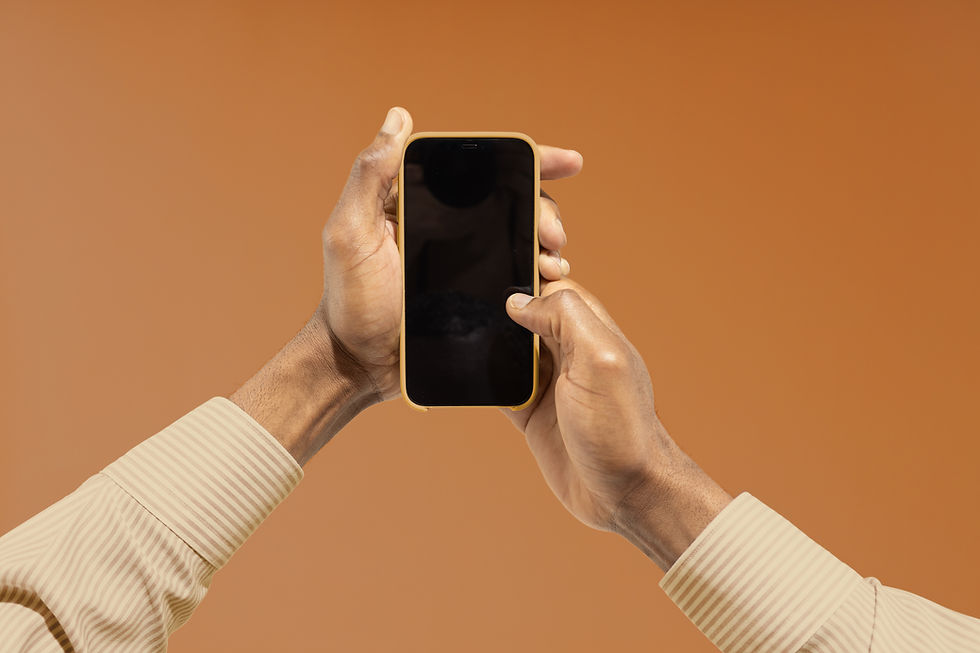Why Can't You Trace a Burner Phone?
- Editorial Staff

- Dec 18, 2024
- 4 min read
You’re watching a thriller, and the main character — a spy, of course — needs to make a quick, untraceable call. They reach into their pocket, pull out a cheap burner phone, dial, chat, and then ... toss it straight into the nearest trash can.
We’ve all seen it in the movies, but this small, disposable phone isn’t just a Hollywood trope. It’s real, and it has a very specific purpose: to keep its users anonymous and untraceable.
Whether it’s for privacy, a little extra security, or other more secretive reasons, a burner phone has some unique qualities that make it tough to track. Let’s take a closer look at what makes burner phones so mysterious.

What Is a Burner Phone?
A burner phone is a prepaid, basic cell phone that people buy for short-term use. Unlike regular phones, which you register with your personal information and keep for years, burner phones are meant to be temporary. They’re used for a specific purpose and then “burned” or discarded.
One of the key features of a burner phone is that it doesn’t require a contract or any personal information to set up. There’s no monthly bill, credit check, or need to sign up with a carrier that keeps your info on file. Instead, users typically pick up a burner phone from a store, activate it with a prepaid SIM card, and start using it right away — no ID required.
While burner phones are sometimes associated with crime or secrecy, they’re actually used by plenty of people for completely legitimate reasons. Maybe you’re traveling internationally and just need a cheap way to stay in touch, or perhaps you’re entering the dating pool and don’t want to share your main phone number with strangers. These are just a few uses of burner phones for everyday people.
How Do Burner Phones Avoid Being Traced?
Now, onto the real question: How does a burner phone manage to stay untraceable? The key lies in the lack of identifying information. Traditional phones create a trail that’s easy for someone to follow, but with a burner phone, there’s no name, address, or billing info connecting it to you.
Additionally, most people use burner phones on prepaid plans. Since you buy credit upfront rather than receiving a bill, there’s no paper trail left behind. If someone really wants to increase their anonymity, they might swap out the phone or SIM card often, making it nearly impossible for anyone to link their activity to a single device.
The Technology Behind the Anonymity
Unlike smartphones that can be tracked by GPS, Wi-Fi, and other networks, burner phones typically work only on cellular networks. They don’t connect to Wi-Fi and rarely have data features, which means there are fewer ways to track their activity.
Burner phones are also often limited to calls and texts, so they’re not logging into apps or connecting to your usual online accounts that could reveal identifying details. Without these data points, it becomes much harder for anyone — whether it’s an app, a service provider, or law enforcement — to connect a burner phone to your other digital activity.
Are There Limitations To Burner Phones’ Anonymity?
While burner phones provide a higher level of anonymity, they aren’t completely foolproof. Certain usage patterns can still expose information. For instance, if someone regularly uses their burner phone in close proximity to their primary phone or repeatedly calls the same contacts, patterns may emerge that hint at their identity.
In some cases, law enforcement agencies can track call records, access cell tower information, or look for recurring behaviors that might link a burner phone back to its owner. It’s worth noting that even without the user’s personal info, a determined investigation can sometimes still follow a trail.
Why Do People Use Burner Phones Today?
Beyond privacy concerns, many people use burner phones for simpler, non-nefarious reasons. For instance, travelers often buy burner phones for temporary international use, avoiding roaming charges on their main line.
Of course, burner phones are also popular with people who simply want to avoid the data tracking and privacy invasions that come with smartphones. In a world where nearly every app and device collects information, some folks just prefer a break from all the tracking.
The Future of Burner Phones in a Digital World
As technology advances, staying “off the grid” with a burner phone may become increasingly challenging. Future laws and technologies might make it harder for burner phones to offer total anonymity.
From tighter regulations on prepaid phones to improvements in digital tracking, the burner phone’s days as a truly untraceable device could be numbered. In some countries, prepaid phones already require ID for purchase, suggesting the anonymity that burner phones offer could soon face new restrictions.
The Appeal and the Limits of Staying Off the Grid
In the end, burner phones hold a certain mystique because they offer a rare chance to stay somewhat “off the grid.” No matter if you’re after privacy, security, or simply a way to separate different parts of your life, a burner phone provides a unique solution.
That said, the untraceable nature of burner phones has its limits. While burner phones may remain a favorite tool in spy movies, real-life users may still need to watch out for the occasional digital breadcrumb.
Related Content


